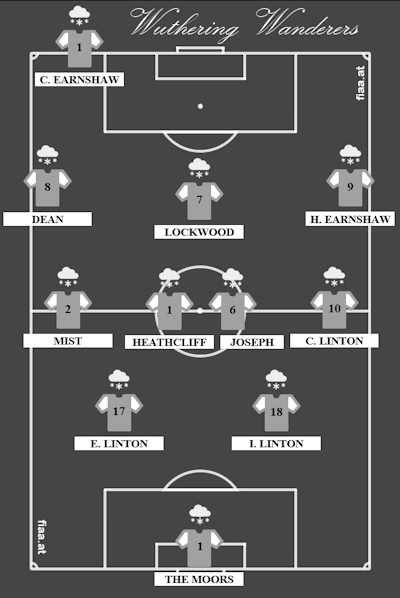[See all Postcards | See all Teamsheets]

The literary leagues of the 19th century were a very male-dominated environment, but female managers still enjoyed some remarkable successes. And none more so than Emily Brontë, who assembled one of the most famous squads of the era in the Wuthering Wanderers team of 1848.
Much of her success can be attributed to Heathcliff, a midfield enforcer and early transfer buy from the Liverpool youth academy. He spent all but three years of his professional career at The Heights stadium, eventually becoming club captain.
An ever-present in the team, Heathcliff rarely showed the opposition (or his own teammates) any mercy. Questioned on his brutal playing style by one journalist, he famously replied:
I’ll be as dirty as I please, and I like to be dirty, and I will be dirty!
This incident led Brontë to place strong restrictions on media activities. The strikers Dean and Lockwood were the only two players subsequently allowed to give pre- and post-match interviews.
Another famous name nurtured by Brontë was the mercurial talent, Catherine Earnshaw. She often stamped her character on the team in the early stages of a game, but tended to fade in the second half, often spending the last few minutes of each match wandering forlornly away from the action. A complicated character, her public image was coloured by a viral video clip of her standing outside the dressing room window demanding to be let in.
In goal, the Moors provided a solid, almost impenetrable, barrier, particularly in winter. This was critical to the team’s success, given the weakness of the Linton siblings in defence. Isabella Linton initially favoured a partnership with Heathcliff but soon felt herself in his shadow. She eventually switched to a London club in a double transfer swoop that also saw Linton Heathcliff leave the Wanderers. The youngster would later return but lacked the physical strength to make a real name for himself in Yorkshire football.
Relationships between Heathcliff and the rest of the squad were always a problem for team spirit. For example, Heathcliff and Edgar Linton enjoyed a robust rivalry, with both preferring to exchange passes with Catherine Earnshaw down the left wing. Only Joseph, a long-time servant of the club, was able to tolerate the mood swings of the brooding midfielder.
Heathcliff’s antics also dominated press coverage, which meant the performance of Hareton Earnshaw and Cathy Linton on the right side of the team went largely unacknowledged. The two were often at odds early in their careers but eventually formed a durable and promising partnership.
Brontë herself was one of three sisters managing in the Literary Leagues. Her team never had the charisma or aesthetic qualities of a Highbury Town or Hellas Verona, but its gritty style and flawed captain ensured both success and popularity. She never managed another club, sadly retiring early at the age of just 30.